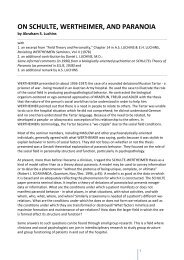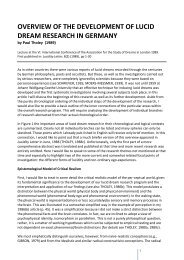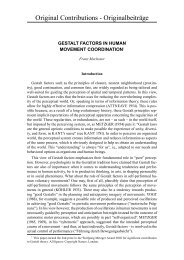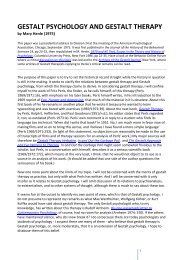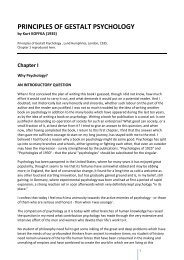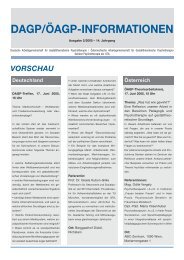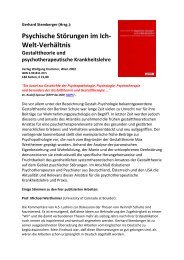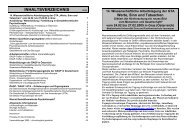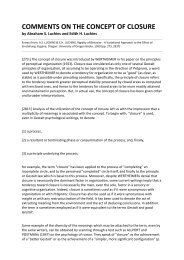pdf-Download - Society for Gestalt Theory and its Applications (GTA)
pdf-Download - Society for Gestalt Theory and its Applications (GTA)
pdf-Download - Society for Gestalt Theory and its Applications (GTA)
You also want an ePaper? Increase the reach of your titles
YUMPU automatically turns print PDFs into web optimized ePapers that Google loves.
theories advocated by the Würzburgers. On a series of cards, he presented typed words, a<br />
stimulus word <strong>and</strong> a task or Aufgabe, <strong>and</strong> asked the subjects <strong>for</strong> a careful introspective description<br />
of their thinking. Examples follow of the stimulus word, the Aufgabe, <strong>and</strong> a particular final<br />
response word, but not the detailed protocol:<br />
Hunting - Coordinate<br />
Hunting - Superordinate<br />
Parson - Coordinate<br />
Poem - Superordinate<br />
Rowing<br />
Sport<br />
Chaplain<br />
Work of Art<br />
Sometimes the task was to find the opposite of a stimulus word, or to name a part of the stimulus<br />
word or a whole of which the word was a part.<br />
Based on analysis of hundreds of protocols, SELZ accepted the Würzburgers' ideas that thought<br />
need not be accompanied by images <strong>and</strong> that association was not adequate to explain thinking,<br />
but rejected the notion of a determining tendency inherent in the stimulus word. Rather, he<br />
emphasized the integration of the stimulus word <strong>and</strong> the Aufgabe into a Gesamtaufgabe, a<br />
complex of relationships. In difficult tasks, the complex may be incomplete but may serve as an<br />
antizipierendes, a schematic anticipation or anticipatory scheme, whose completion yields the<br />
response word. To SELZ, both reproductive <strong>and</strong> productive thinking consisted essentially of the<br />
completion of the anticipatory schema.<br />
SELZ described his experiments in two large books, the first one published in 1913 <strong>and</strong> the second<br />
in 1922.[22b] Portions of them are translated into English in the volume edited by FRIJDA <strong>and</strong> DE<br />
GROOT,[22] which also includes a condensation, both in German <strong>and</strong> English, of SELZs 1924 work<br />
on productive <strong>and</strong> reproductive thinking.[22c] SELZ had about 30 publications.<br />
SELZ never married. All his life he found it difficult to engage in close relationships, perhaps a<br />
consequence of the "fundamental aloofness between father <strong>and</strong> son" (p.3).[22a]<br />
In 1920 SELZ was offered a lectureship in the philosophy of law at the University of Bonn where in<br />
1921 he was appointed "professor extraordinary," which obligated him to give a weekly one-hour<br />
lecture on the philosophy of law each semester. This occupation with law may have contributed to<br />
his writing style "that is nothing short of torture to his readers" (p. 4).[22a]<br />
In 1923 he accepted an invitation to the Chair of Philosophy, Psychology, <strong>and</strong> Pedagogy in the<br />
H<strong>and</strong>elshochschule of Mannheim. On 4 December 1923 the Minister of Education <strong>and</strong> Culture<br />
appointed him a full professor. For ten years he held the position, even attaining the honor of<br />
Vice-Chancellorship in 1929. Thus, at the start of April 1933, SELZ was 52 years old, <strong>and</strong> the<br />
incumbent of the Wilhelm WUNDT Chair <strong>and</strong> Director of the Mannheim Institute of Psychology.<br />
But along with other Jews, in 1933 he was dismissed from his position, his <strong>for</strong>tunes <strong>for</strong>ever<br />
changed by the Nazis. "By Decree No. A 7642 of the Baden Minister <strong>for</strong> Culture <strong>and</strong> Education,<br />
issued on April 6, 1933 <strong>and</strong> conveyed on the morrow by the Rector of the school, he had been<br />
notified that in the interest of the maintenance of security <strong>and</strong> public order he was sent on<br />
indefinite leave of absence" (p. 13).[22d] From then on he no longer had access to the Mannheim<br />
Institute. SELZ suffered terribly from being cut off from the Institute <strong>and</strong> his colleagues. Initially he<br />
25



